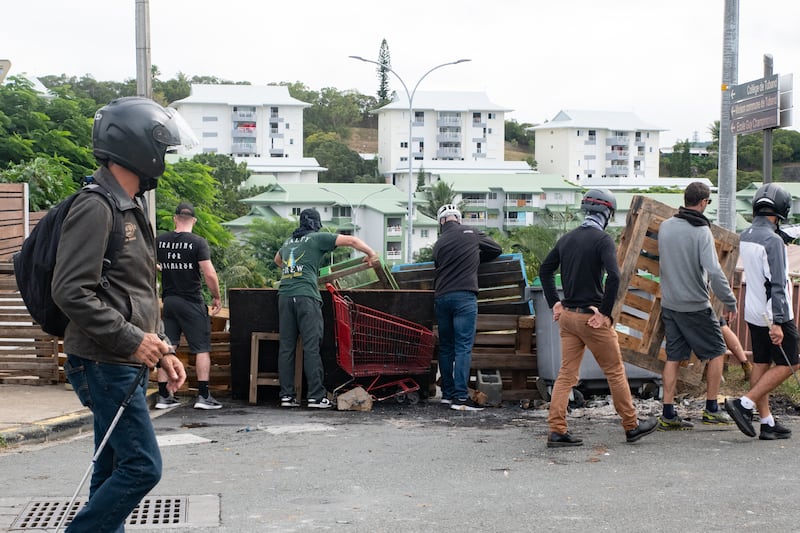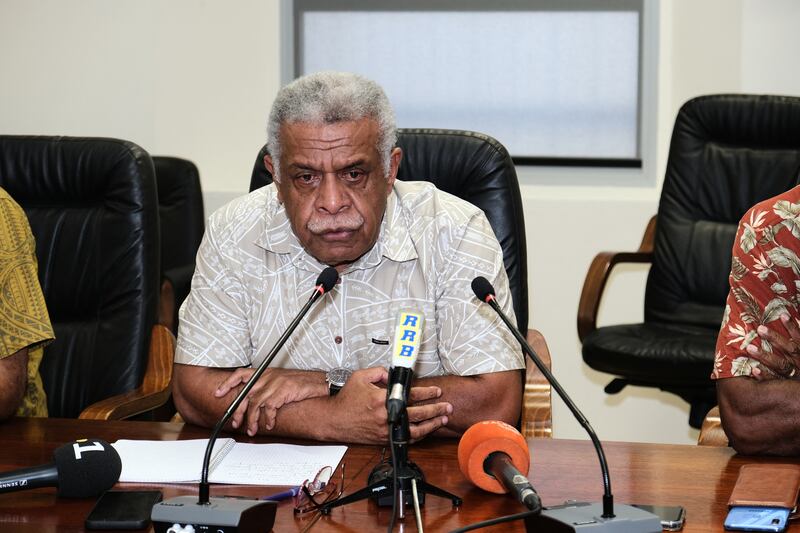France imposed a state of emergency on New Caledonia as it attempts to quell several days of unrest triggered by its move to diminish the voting power of the Pacific island territory’s indigenous Kanak people.
France’s High Commissioner Louis Le Franc said four people have died in the rioting centered on the capital Noumea - three Kanak independence supporters and a police officer who was reportedly shot.
“Significant means continue to be implemented by the state to restore order and ensure the protection of the population,” Le Franc said in a statement Thursday. “An air bridge between France and the territory will make it possible to quickly transport internal security, civil security and military reinforcements.”
Despite a curfew and ban on gatherings, businesses have been torched, roads blocked and gunfire exchanged between security forces and thousands of independence supporters in the three days of violence that Le Franc said was “a dangerous spiral - a spiral that is deadly.”
After condemning the violence, French President Emmanuel Macron asked his Council of Ministers to declare a state of emergency, which went into effect before dawn in New Caledonia on Thursday and gives authorities sweeping search, arrest and censorship powers.
“All violence is intolerable and will be met with an unwavering response to ensure the return of order,” a statement from Macron’s office said.
The Kanak Front de Liberation Nationale Kanak et Socialiste independence movement appealed for peace to be restored, but also condemned the constitutional amendment and France’s rejection of calls to withdraw it from consideration.
France and political leaders in New Caledonia should resume dialogue and reach an internationally recognized agreement “allowing New Caledonia to continue its path towards emancipation,” FLNKs said in a statement.

The unrest is the worst political violence to hit the Pacific island located between Australia and Fiji since the 1980s. Five alleged leaders of the uprising are under house arrest and about 200 people in total have been detained, Le Franc said. More than 60 security personnel were injured.
The rioting erupted as the lower house of France’s parliament debated and subsequently approved a constitutional amendment to “unfreeze” New Caledonia’s electoral roll, which would give the vote to thousands of French immigrants and create a significant obstacle to the autonomy aspirations of Kanaks.
Final approval of the amendment requires a joint sitting of France’s lower house and Senate. Interior Minister Gérald Darmanin told the lower house that it was undemocratic for some 42,000 people–about one in five possible voters in New Caledonia–to be disenfranchised.
Kanaks are about 40% of New Caledonia’s 270,000 people but are marginalized in their own land - they have lower incomes and poorer health than Europeans who make up a third of the population and occupy most positions of power in the territory.
New Caledonia’s pro-independence government - the first in its history - could lose power in elections due in December if the electoral roll is enlarged.

“The message I have on behalf of the government is to have confidence in the future. You have to have faith in the future,” said Louis Mapou, a pro-independence Kanak politician who is president of the island’s government.
“You need to trust the ability of your political leaders to get the country out of the situation we are in,” he told a press conference. “There’s no choice, no other way out.’
France’s control of New Caledonia and its surrounding islands gives the European nation a significant security and diplomatic role in the Pacific at a time when the U.S., Australia and other Western countries are pushing back against China’s inroads in the region. New Caledonia also has valuable nickel deposits that are among the world’s largest.
The Kanak independence movement, like the West Papuan movement for independence from Indonesia, has significant support in Pacific island nations that shook off colonial rule last century.
The Melanesian Spearhead Group - which groups Papua New Guinea, Solomon Islands, Vanuatu, Fiji and the FLNKS - has opposed France’s constitutional amendment.
“These events could have been avoided if the French Government had listened and not proceeded to bulldoze the Constitutional Bill aimed at unfreezing the electoral roll,” said MSG chair and Vanuatu’s Prime Minister Charlot Salwai in a statement, supporting the FLNKS’ call for the appointment of a mutually agreed mediator.
New Caledonia voted by modest majorities to remain part of France in referendums held in 2018 and 2020 under a U.N.-mandated decolonization process. Three votes were part of the Noumea Accord to increase Kanaks’ political power following deadly violence in the 1980s.
A contentious final referendum in 2022 was overwhelmingly in favor of continuing with the status quo. However supporters of independence have rejected its legitimacy due to very low turnout - it was boycotted by the independence movement - and because it was held during a serious phase of the COVID-19 pandemic, which restricted campaigning.
Loyalist and pro-independence groups earlier in the week released a joint statement calling for calm.
“We are convinced that it is through dialogue and resilience that we can collectively get out of this situation,” it said.
